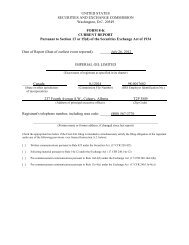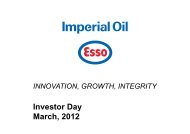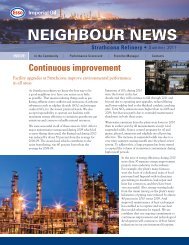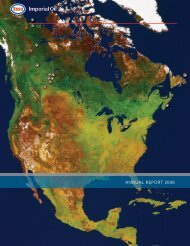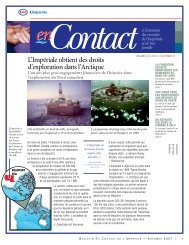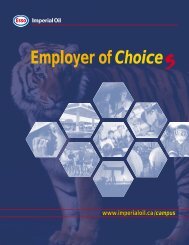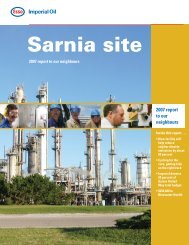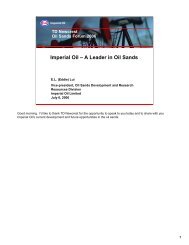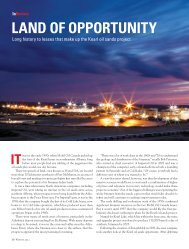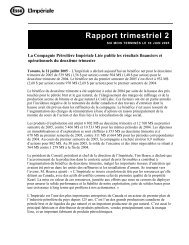FORM 10-K IMPERIAL OIL LIMITED
FORM 10-K IMPERIAL OIL LIMITED
FORM 10-K IMPERIAL OIL LIMITED
You also want an ePaper? Increase the reach of your titles
YUMPU automatically turns print PDFs into web optimized ePapers that Google loves.
(1) K.C. Williams was on a loan assignment from Exxon Mobil Corporation until July 31, 2004 and J.M. Yeager is from<br />
August 1, 2004. Their compensation was paid to them directly by Exxon Mobil Corporation in United States dollars,<br />
and is disclosed in United States dollars. Also, they received employee benefits under Exxon Mobil Corporation’s<br />
employee benefit plans, and not under the Company’s employee benefit plans. The Company reimburses Exxon Mobil<br />
Corporation for the compensation paid and employee benefits provided to them.<br />
(2) Any part of bonus elected to be received as deferred share units is excluded.<br />
(3) Amounts under “Other Annual Compensation”, except for K.C. Williams and J.M. Yeager, consist of interest paid in<br />
respect of deferred payments for long term incentive compensation, other than the Company’s plan for deferred<br />
share units for selected executives, described on pages 37 to 39, dividend equivalent payments on restricted stock<br />
units, interest paid in respect of deferred payments of bonuses and reimbursement for any income tax paid as a<br />
result of use of company aircraft. The amounts also include an earned benefits allowance which in 2004 was $90,000<br />
for T.J. Hearn, $45,000 for P.A. Smith, $45,000 for B.J. Fischer and $35,000 for J.F. Kyle. For T.J. Hearn and P.A.<br />
Smith, the U.S. dollar amounts were payments by the Company on account of U.S. income taxes incurred while on<br />
assignment in the U.S.A. For K.C. Williams and J.M. Yeager, the amounts are the net payments by Exxon Mobil<br />
Corporation on account of Canadian income taxes and other compensation for assignment outside of the United<br />
States. Each year, while on assignment, T.J. Hearn and P.A. Smith paid to the Company and K.C. Williams and J.M.<br />
Yeager paid to Exxon Mobil Corporation amounts that were approximate to the income taxes that would have been<br />
imposed if they were resident in their originating country of employment.<br />
(4) In 2002, the Company granted stock options which are described on page 38.<br />
(5) These include the number of units granted under the Company’s plan for deferred share units for selected executives<br />
described on page 38. The values and number of these units, as at the end of 2004, were $7,034 for <strong>10</strong>0 units for<br />
T.J. Hearn, nil for P.A. Smith and J.F. Kyle and $1,426,373 for 20,047 units for B.J. Fischer. These amounts include no<br />
deferred share units elected to be received in lieu of bonus for 2004, 2003 and 2002 for B.J. Fischer, P.A. Smith and<br />
J.F. Kyle, and <strong>10</strong>0 deferred share units based on $7,034 of bonus elected to be received as deferred share units for<br />
2004 for T.J. Hearn.<br />
(6) These also include restricted stock units granted under the Company’s plan for restricted stock units for selected<br />
key employees and nonemployee directors described on pages 38 and 39. The values and number of these units,<br />
as at the end of 2004, were $12,408,560 for 174,400 units for T.J. Hearn, $3,450,775 for 48,500 units for P.A. Smith,<br />
$5,876,990 for 82,600 units for B.J. Fischer, and $2,504,480 for 35,200 units for J.F. Kyle. The values of these<br />
units granted for 2004, as at the end of 2004 being the date of grant, were $4,582,060 for T.J. Hearn, $1,373,195 for<br />
P.A. Smith, $2,433,330 for B.J. Fischer, and $939,180 for J.F. Kyle. The values of these units granted for 2003, as at<br />
the end of 2003 being the date of grant, were $3,451,800 for T.J. Hearn, $960,751 for P.A. Smith, $1,536,051 for<br />
B.J. Fischer, and $655,842 for J.F. Kyle. The values of these units granted for 2002, as at the end of 2002 being<br />
the date of grant, were $2,243,000 for T. J. Hearn, $560,750 for P.A. Smith, $973,462 for B.J. Fischer and $475,516<br />
for J.F. Kyle.<br />
(7) K.C. Williams and J.M. Yeager participate in Exxon Mobil Corporation’s restricted stock plan which is similar to the<br />
Company’s restricted stock unit plan. The value and number of these units for K.C. Williams, as at the end of the<br />
year, were U.S. $2,398,968 for 46,800 units. The value and number of these units for J.M. Yeager, as at the end of the<br />
year, were U.S. $4,170,924 for 81,368 units. Under that plan, K.C. Williams was granted 23,400 units in 2003 whose<br />
value on the date of grant was U.S. $959,400 and 23,400 units in 2002 whose value on the date of grant was<br />
U.S. $8<strong>10</strong>,576. Under that plan, J.M. Yeager was granted 31,400 units in 2004, whose value on the date of grant was<br />
U.S. $1,609,564.<br />
(8) Payouts were from 2003 earnings bonus units that reached maximum value of $3.00 per unit in 2004. That plan is<br />
described on page 38.<br />
(9) Amounts under “All Other Compensation”, except for K.C. Williams and J.M. Yeager, are the Company’s contributions<br />
to the savings plan, which is a plan available to all employees. Under one of the options of that plan to which the<br />
senior executives subscribe, except for K.C. Williams and J.M. Yeager, the Company matched employee contributions<br />
up to six percent of base salary per year; however, an employee may elect to receive an enhanced pension<br />
under the Company’s pension plan by foregoing three percent of the Company’s matching contributions. The plan is<br />
intended to be primarily for retirement savings, although employees may withdraw their contributions prior to<br />
retirement. For K.C. Williams and J.M. Yeager, the amounts are Exxon Mobil Corporation’s contributions to its<br />
employee savings plan.<br />
Long term incentive compensation<br />
Consistent with the Company’s compensation philosophy of being performance driven, long term<br />
incentive compensation is granted to retain selected employees and reward them for high performance.<br />
The compensation has generally been in the form of units.<br />
The assessment of employee performance is conducted through the Company's appraisal program.<br />
The appraisal program is a disciplined annual program that incorporates business performance measures<br />
relevant to eligible employees, and involves ranking of employee performance using a consistent process<br />
throughout the organization at all levels. The number of units received by each employee is tied to the<br />
performance of the employee in achieving these business performance measures. The scope of the<br />
Company program is determined by the overall performance of the Company each year.<br />
The Company’s incentive share units give the recipient a right to receive cash equal to the amount by<br />
which the market price of the Company’s common shares at the time of exercise exceeds the issue price of<br />
the units. These units were granted prior to 2002. The issue price of the units granted to executives was the<br />
closing price of the Company’s shares on the Toronto Stock Exchange on the grant date. Incentive share<br />
units are eligible for exercise up to <strong>10</strong> years from issuance.<br />
37



